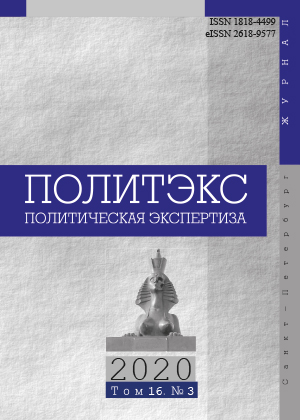CONFLICT OF INTERPRETATIONS OF LATGALIAN ETHNO-POLITICAL IDENTITY IN MODERN LATVIAN SOCIETY
DOI:
https://doi.org/10.21638/spbu23.2020.302Abstract
Latgalians are an ethnic group located in Latvia characterized could be characterized by an extremely undefined status. In the public discourse there are two narratives, that are opposite in meaning, constructing which form the ethnopolitical status of the people of Latagle and their historical memory. The first reflects the official position of the Latvian state, and is based on the non-recognition of Latgalians as an independent ethnic group. Also, interoperating the Latgalian language is viewed as a variant of the Latvian language and there is historical reference to the 1917 Latgale Congress that united Latvia. The opposite narrative affirms asserts the historical and cultural autonomy of the Latgalian people and the independence of the Latgalian language, based on the history of the struggle for the political autonomy of Latgale and the historical memory of discrimination by the Latvian majority as well. The article analyzes the fundamental factors contributing to irreparable the unavoidable uncertainty of in the construction of Latgalian identity and the impracticability of both political narratives. The limited and insufficient logic of postcolonial theory, which is regularly used to characterize ethnopolitical processes in the post-Soviet space and, in particular, in Latvia is shown in the article. It is concluded that the fundamental uncertainty factors of Latgalian identity, intensified by the action could be reinforced by the action of European integration processes, impede the possibility of political mobilization based on both nationalist state policy and the idea of Latgalian ethnopolitical autonomy.
Keywords:
Latgalians, Latgalian language, Latvia, ethnopolitics, politics of identity, historical memory
Downloads
References
Brubaker R. Nationalism Reframed. Nationhood and the National Question in the New Europe. Cambridge: Cambridge University Press, 1996. 202 p.
Council of Europe. 3rd Opinion on Latvia. Advisory committee on the Framework Convention for the Protection of National Minorities [Electronic source]. 23.02.2018. Available at: https://rm.coe.int/revised-version-of-the-english-language-version-of-the-opinion/1680901e79 (accessed: 08.07.2020).
Duina F., Miani C. Fitting in the Baltics: national identity, minorities and compliance with EU accession requirements in Lithuania and Latvia. Comparative European Politics, 2015, vol. 13.5, pp. 535–552.
Eurobarometer Interactive. Public Opinion. 2020. [Electronic source]. Available at: https://ec.europa.eu/commfrontoffice/publicopinion/index.cfm/Chart/index (accessed: 08.07.2020).
Hanovs D. Can postcolonial theory help explain Latvian politics of integration? Reflections on contemporary Latvia as a postcolonial society. Journal of Baltic Studies, 2016, vol. 47.1, pp. 133–153.
Jones S. Constructing identities in the past and present. London; New York, Routledge, 1997. 185 p.
Krauze M. Latvian nationalism and the construction of ‘Latgalian identity’. Journal of the Anthropological Society of Oxford Online, 2014, no. 1, pp. 35–60.
Lazdina S. Latgalian in Latvia: layperson regards to status and process of revitalization. In: Multilingualism in the Baltic States: Societal Discourses and Contact Phenomena, ed. by S. Lazdina and H. F. Marten. London, Palgrave Macmillan, 2019, pp. 59–88.
Lazdina S., Marten H. F. Latgalian in Latvia: A continuous struggle for political recognition. Journal on Ethnopolitics and Minority Issues in Europe, 2012, vol. 11, pp. 66–87.
Marten H. F. ‘Latgalian is not a language’: linguistic landscapes in Eastern Latvia and how they reflect centralist attitudes. In Minority Languages in the Linguistic Landscape, ed. by D. Gorter, H. F. Marten, L. Van Mensel. New York, Palgrave Macmillan, 2012, pp. 19–35.
Marten H. F., Šuplinska I., Lazdiņa S. Latgalian: The Latgalian language and education in Latvia. Ljouwert, Mercator European Research Center on Multilingualism and Language Learning, 2009. 64 p.
Ministru kabinets. Ministru prezidenta uzruna Latgales simtgades kongresā 2017.gada 5.maijā [Electronic source]. 05.05.2017. Available at: https://www.mk.gov.lv/lv/content/ministru-prezidenta-uzruna-latgales-simtgades-kongresa-2017gada-5maija (accessed: 08.07.2020)
Plakans A. A Concise History of the Baltic States. Cambridge, Cambridge University Press, 2011. 474 p.
Sharov K. S. Constructivist Paradigm in Studying Nationalism and National Problems. Vestnik Moskovskogo universiteta. Seriia 7. Filosofiia, 2006, no. 1, pp. 59–72. (In Russian)
Szayna T. S. Identifying Potential Ethnic Conflict: Application of a Process Model. Santa Monica, RAND, 2000. 329 p.
Valsts valodas likums. Latvijas Vēstnesis, 428/433. [Electronic source]. 21.12.1999. Available at: https://www.vestnesis.lv/ta/id/14740-valsts-valodas-likums (accessed: 08.07.2020).
Yang P. Q. Ethnic Studies: Issues and Approaches. New York, State University of New York Press, 2000. 312 p.
Downloads
Published
How to Cite
Issue
Section
License
Articles of "Political Expertise: POLITEX" are open access distributed under the terms of the License Agreement with Saint Petersburg State University, which permits to the authors unrestricted distribution and self-archiving free of charge.




